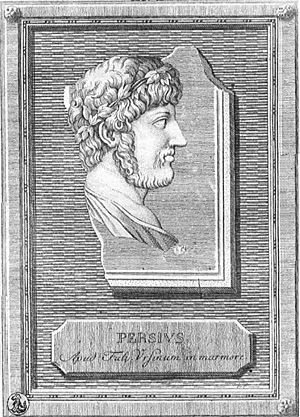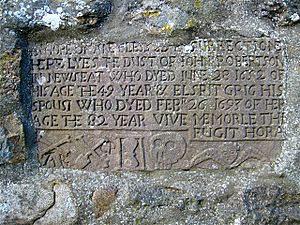Persius facts for kids
Aulus Persius Flaccus (born December 4, 34 AD – died November 24, 62 AD) was a famous Roman poet and writer of satires. He came from the Etruscan region. In his writings, he shared ideas from Stoic philosophy. He also strongly criticized what he saw as bad writing styles of other poets at the time. His works became very popular during the Middle Ages. After his death, his friend and teacher, the Stoic philosopher Lucius Annaeus Cornutus, published his writings.
Contents
Life of Persius
Persius was born into a wealthy family in Volterra, a small Etruscan city. His family was well-respected on both his mother's and father's sides. When he was six years old, his father passed away. His stepfather died a few years later.
Early Life and Education
At the age of twelve, Persius moved to Rome. There, he was taught by famous teachers like Remmius Palaemon and the speaker Verginius Flavus. Over the next four years, he made important friends. These included the Stoic philosopher Lucius Annaeus Cornutus, the poet Caesius Bassus, and another poet named Lucan. Lucan greatly admired Persius's writing. Persius also became very close friends with Thrasea Paetus, who was related to Persius's family. They traveled together often. Later, he met Seneca, but Persius was not very impressed by him.
Writing and Personality
When he was young, Persius wrote a play about Roman history. He also wrote another work, possibly about travel. Reading the satires of another writer named Lucilius inspired Persius to write his own satires. He wrote slowly and not very often. Sadly, he died early due to an illness, so he could not finish his book of satires.
People described Persius as having a "gentle nature" and being "modest." He was also said to be very devoted to his mother, Fulvia Sisennia, his sister, and his aunt. He left his large fortune to his mother and sister. His friend Cornutus decided to publish only Persius's satires. He made a few small changes and then gave them to Bassus to prepare for publication. The satires became an instant success.
Persius was a keen observer of life around him. He did not hesitate to describe the difficult parts of society. He especially focused on how too much spending could lead to moral problems. Unlike Horace, Persius was not as easy-going about human weaknesses. His sensitive nature might also be seen in how often he mentioned people being made fun of.
Persius's Writings
The main importance of Persius's work comes from how it fits into Roman satire. It also shows how Stoicism was understood in Rome and how he used the Latin language. The writer Horace greatly influenced Persius, even though his biography does not mention it. Persius used characters, phrases, and ideas directly from Horace.
Persius's satires are written in a poetic style called hexameters. This is a common type of poetry. His first satire criticizes the writing styles of his time. He believed these styles showed a decline in the country's morals. He describes people who recite poetry and talk about literature after dinner.
Themes of His Satires
Persius's satires cover different topics:
- Satire 2: What we can fairly ask from the gods.
- Satire 3: How important it is to have a clear goal in life.
- Satire 4: Why public figures need to understand themselves.
- Satire 5: The Stoic idea of freedom. This satire mentions the teachings of his friend Cornutus.
- Satire 6: How to use money wisely.
His biography tells us that the satires were not fully finished when he died. Some lines were removed from the end so the work would seem complete. Cornutus also removed a part that made a rude comment about the emperor's taste in literature. Even so, some parts still show that the work was not fully revised.
Images for kids
See also
 In Spanish: Aulo Persio Flaco para niños
In Spanish: Aulo Persio Flaco para niños
 | Delilah Pierce |
 | Gordon Parks |
 | Augusta Savage |
 | Charles Ethan Porter |




